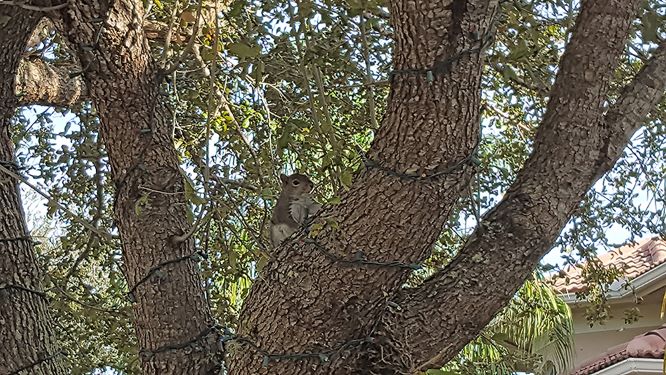Squirrels will frequently make nests in attics, and wreak havoc in gardens and landscapes. A particularly troublesome habit they harbor is their affinity for chewing on electrical wires
The consequences of such behavior are not just an inconvenience; they can lead to hazardous situations, including fires and significant repair expenses.
Fortunately, the silver lining lies in our ability to thwart these furry culprits…
In the following sections, we’ll delve into eight effective strategies to put a halt to squirrels chewing on wires, ensuring both the safety of your property and your peace of mind.

Squirrel chewing on the String lights in this tree. | Photo By Rocco on Catchpiece.com
Why Squirrels Chew Wires
Squirrels and other rodents like mice and rats have a single pair of continuously growing incisor teeth in the upper and lower jaw, which requires them to gnaw on various materials to continuously keep their teeth filed down to a healthy length for survival purposes.
They like to chew on all sorts of materials including phone lines, landscape lighting, Christmas holiday lights, car engine wires, and even power wires.
So how do you stop them from damaging your stuff?
Eight Ways To Stop Squirrels From Chewing Wires:
- Use Hot Pepper Repellent Sprays to Deter Chewing.
- Protect Engine Wires With Electronic Devices.
- Protect Engine Wires With Rodent Tape.
- Use Rodent Repellent for Car Engines.
- Protect Power and Telephone Lines With a Conduit.
- Use Waterproof Direct Bury Wires.
- Use a Live Trap to Relocate Squirrels.
- Use a Lethal Trap to Kill Squirrels.
Use Hot Pepper Sprays to Deter Squirrels
Each holiday season, I delight in adorning my home with twinkling Christmas lights, creating a festive spectacle for the kids to enjoy. Yet, like clockwork, the mischievous neighborhood squirrels seem determined to transform my decorative display into their playground, mangling a set of lights without fail.
Enter my secret weapon: a homemade, hot pepper spray that not only adds a kick to my culinary creations but serves as a formidable defense against squirrel wire-chewing escapades.
Being an avid gardener, I take pride in cultivating hot peppers, and when my crop is bountiful, I whip up a potent pepper sauce.
Mixing this fiery concoction with water in a spray bottle provides a simple yet effective shield for my Christmas lights.
The squirrels, repelled by the burning taste, quickly learn to associate their wire-chewing antics with a spicy consequence, prompting them to steer clear.

To apply, I hang the lights, ensure they’re in working order, and then give them a protective spritz. Removing the lights post-festivities is a breeze – a quick hose down and they’re ready for storage. As a bonus, the leftover hot pepper sauce doubles as a deterrent for garden-dwelling squirrels and other curious critters.
But the magic doesn’t stop there! Mix the hot sauce with birdseed to create an avian-friendly yet squirrel-repellent delight for your bird feeder. Birds remain unfazed by the spicy blend, while squirrels are left disgruntled by the taste. Of course, a word of caution: wear gloves when handling hot peppers, and resist the temptation to touch your face or eyes after safeguarding your holiday lights.
For those without a garden full of peppers, fear not!
Coles Hot Pepper sauce, available on Amazon.com, is a convenient alternative.
Originally designed for mixing with birdseed, this versatile sauce proves equally effective when used as a spray.
Just a weekly reapplication, especially after rain, keeps those squirrels at bay, ensuring a holiday season free from wire-chewing surprises.


